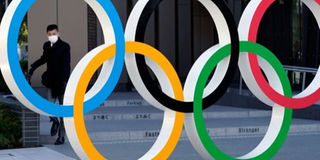Complicated equations in postponing Olympics

The postponement of the Tokyo Games to 2021 has left many stakeholders counting heavy costs. AFP photo
TOKYO- The Tokyo Olympics organisers on Tuesday pushed back the Games to the Summer of 2021, leaving many stakeholders cursing the extent of the wrath of coronavirus pandemic.
Several aspects of the Games have been affected as a result.
Competition scheduling
As specialist website Inside the Games put it, the Olympics “gravitate around... a four-year cycle. If you wake up and the sun is in a completely different place, there are going to be consequences.”
Shoehorning an Olympics into what is already a packed sporting calendar in 2021 will be a logistical nightmare for both athletes, administrators and broadcasters.
One potential clash is the World Athletics Championships, currently scheduled for August 2021 in the US – a lucrative pay-day for athletes and TV networks.
Swimming is also scheduled to hold its World Championships in Japan from July 16 to August 1, 2021.
Adding to the crowded schedule is Euro Championships, already postponed from 2020.
Olympic legend Carl Lewis has put the case for holding the Summer Games in 2022 alongside that year’s Winter Games in Beijing, creating a “celebratory Olympic year.”
Venues
There are 43 Olympic sites – some temporary, some purpose-built, others repurposed for the Tokyo 2020 Games – and all of them are reeling from the postponement.
The IOC highlighted this as one of the main concerns, warning: “A number of critical venues needed for the Games could potentially not be available anymore.”
For example, one of the main selling points of the brand new 68,000-seater Olympic Stadium was that it would hold “cultural and sporting events” after the Games were over. Any such event would now need to be moved if it clashes with a rescheduled Games.
And it’s not just sporting venues. Organisers have block-booked the enormous Tokyo Big Sight exhibition centre to host the thousands of international journalists covering the Games.
This is one of Asia’s premier venues for hosting large-scale conferences, and is booked many months in advance.
Athletes’ village
A major question mark hangs over the athletes’ village, which occupies some prime real estate overlooking Tokyo Bay with a view of the city skyline and its famous Rainbow Bridge.
It will have 21 towers of between 14 and 18 floors with a total capacity of 18,000 beds during the Olympics and 8,000 for the Paralympics.
The plan was to renovate and convert the village into thousands of luxury condos, which are being sold off or put up for rent. Some 4,145 units were to be put up for sale. Viewings and sales of a first batch of 940 apartments began in 2019 and the vast majority have already been snapped up.
Postponement now means delaying the renovation process and huge uncertainty for those who have already signed contracts.
Hotels
Among the many challenges the IOC cited was that “the situations with millions of nights already booked in hotels is extremely difficult to handle.”
In fact, one of the concerns before the coronavirus hit was a possible dearth of hotel rooms. One idea was to park a cruise ship offshore for emergency accommodation. Hotel rooms have been block-booked in advance for many months. Many have paid a large deposit in advance and could face losing this, in addition to having to re-book for the new date.
Numbers
According to Nikkei daily, organisers estimate it will cost an extra $2.7 billion, to reboot venue rentals, rebooking hotels and additional payments for staff and security guards, among others.
Individual event tickets ranged in price from about $40 (beach volleyball) to just over $1,100 (track and field medal), with many priced from $100 to $300. There are also packages, which bundle together accommodations and tickets, and sometimes transportation and VIP hospitality passes. These start at about $4,800 and top out at over $19,000 per person.




